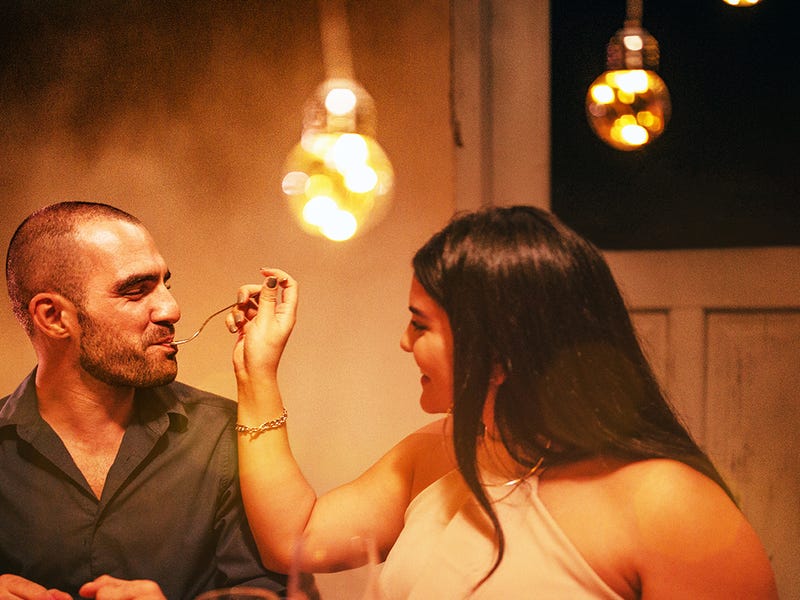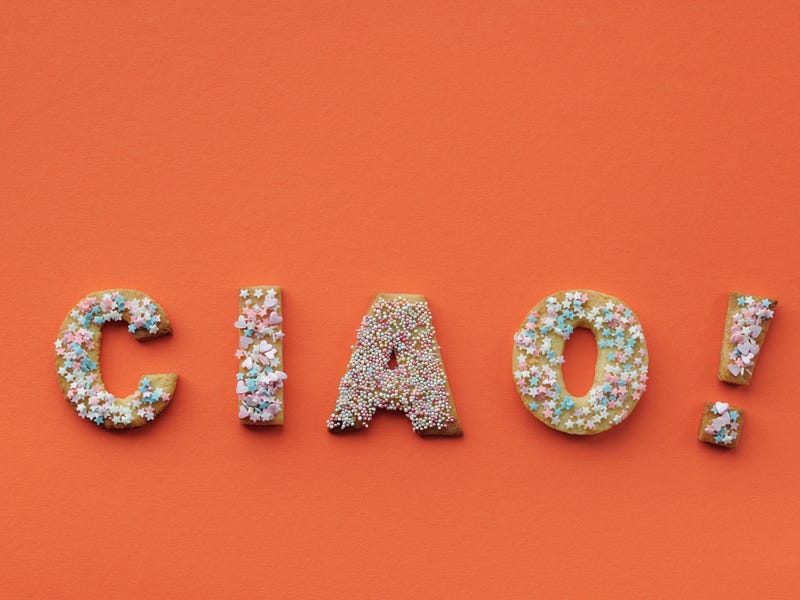
How to say goodbye in Italian in 60 reliable ways [real life & email]
Author: Jessica Maggi
With every hello, there inevitably comes a goodbye. So, if you plan on striking up a conversation with a native Italian speaker anytime soon, it’s wise to have some exit strategies in mind.
There are so many different ways to say goodbye in Italian, it can actually be a bit overwhelming at first. But don’t panic. Say goodbye to your fears, we’re here to help!
In this post, we’ll show you how to say goodbye in Italian, and how to appropriately end a conversation face-to-face, on the phone, or via email. Which expression you use will depend a lot on whether the situation is formal, informal, or professional.
Learning different ways to say goodbye in Italian and how to use them correctly will go a long way. It’ll help you understand native speakers better, sound more natural when speaking Italian, and manage social situations with ease. Ready to level up in your conversational basics? Let’s get started!

Download our free saying goodbye poster
Ready to learn many different ways to say bye in Italian? Download this free poster. Let’s go!
How to say goodbye in Italian
There are several different ways to say goodbye in Italian. Let’s start with the most basic ones. You can use these phrases and expressions in everyday situations, which include conversations with friends, family members, long-time work colleagues, close coworkers, and people you know well and can be casual with.
We’ve gathered some of the most common phrases to say goodbye like a native speaker would in the table below. Take some time to have a look at them, read through the list, and try to pronounce them out loud to practice your pronunciation.
| English | Italian | IPA | Pronunciation | Context |
|---|---|---|---|---|
| Goodbye. | Arrivederci. | [arɾivedˈɛrt͡ʃɪ] | ah-ree-veh-dehr-chee | All purpose |
| Bye. | Ciao. | [ˈtʃao] | chow | Informal |
| Bye-bye. | Ciao ciao. | [ˈtʃao ˈtʃao] | chow chow | Informal |
| Bye, everyone. | Ciao a tutti. | [t͡ʃˈao ˈaː tˈutːɪ] | chow ah tut-tee | Informal |
| Goodbye. | Salve. | [sˈalve] | sal-veh | All purpose |
| Till next time. | Alla prossima. | [ˈalla prˈɔs͡sima] | ahl-lah prohs-see-mah | All purpose |
| See you. | Ci vediamo. | [ˌt͡ʃi‿v.veˈdja.mo] | chee-veh-dee-ah-moh | All purpose |
| See you. | Ci si vede. | [t͡ʃˈi sˈi vˈede] | chee see-veh-deh | Informal |
| See you later. | A dopo. | [ˈaː dˈopo] | ah doh-poh | All purpose |
| See you later. | A più tardi. | [ˈaː pjˈu tˈardɪ] | ah peeuh tahr-dee | All purpose |
| We will see each other soon. | Ci vediamo presto. | [t͡ʃˈi vedjˈamo prˈɛsto] | chee veh-dee-ah-mo prah-stoh | All purpose |
| See you soon. | A presto. | [ˈaː prˈɛsto] | ah prah-stoh | All purpose |
| In a bit. | A tra poco. | [ˈaː trˈa pˈɔko] | ah trah poh-koh | All purpose |
| See you tomorrow. | A domani. | [ˈaː domˈanɪ] | ah doh-mah-nee | All purpose |
| See you tonight. | A stasera. | [ˈaː stˌasˈera] | ah stah-seh-rah | All purpose |
| Speak soon. | Ci sentiamo. | [t͡ʃˈi sentjˈamo] | chee sen-tee-ah-moh | All purpose |
| Speak to you tomorrow. | Ci sentiamo domani. | [t͡ʃˈi sentjˈamo domˈanɪ] | chee sen-tee-ah-moh doh-mah-nee | All purpose |
| Will talk to you later. | Ci sentiamo dopo. | [t͡ʃˈi sentjˈamo dˈopo] | chee sen-tee-ah-moh doh-poh | All purpose |
| We’ll talk soon. | Ci sentiamo presto. | [t͡ʃˈi sentjˈamo prˈɛsto] | chee sen-tee-ah-moh prah-stoh | All purpose |
| Until we speak again. | A risentirci. | [ˈaː rizentˈirt͡ʃɪ] | ah ree-sen-teer-chee | Phone conversation |
| Bye, I’m off. | Ciao, ti saluto. | [t͡ʃˈao, tˈi salˈuto] | chow tee sah-loo-toh | Informal |
| Be good. | Fai il bravo. (male)/ Fai la brava. (female) | [fˈaːi ˈiːl brˈavo]/ [fˈaːi lˈa brˈava] | faee il brah-voh/ faee lah brah-vah | Very informal |
| Be well. | Stammi bene. | [stˈammɪ bˈɛne] | stahm-mee-beh-neh | Informal |
| Have a good day. | Buona giornata. | [bʊˈɔna d͡ʒornˈata] | boo-ohn-ah jor-nah-tah | All purpose |
| Have a nice evening. | Buona serata. | [bʊˈɔna serˈata] | boo-ohn-ah say-rah-tah | All purpose |
| Have a good night. | Buonanotte. | [bʊonanˈɔtːe] | boo-ohn-ah noh-tay | All purpose |
| Have a nice trip. | Buon viaggio. | [bwˈɔn vjˈad͡ʒːo] | boo-ohn vee-ah-gee-oh | All purpose |
| Have a nice weekend. | Buon fine settimana. | [bwˈɔn fˈine setːimˈana] | boo-ohn fee-neh seht-tee-mah-nah | All purpose |
| I must be going. | Devo andare. | [dˈɛvo andˈare] | deh-voh ah-ndah-reh | Informal |
| I'll be right back. | Torno subito. | [tˈorno sˈubito] | tohr-noh suh-bee-toh | All purpose |
| I’m going now. | Vado. | [vˈado] | vah-doh | Informal |
| Gotta go. | Scappo. | [skˈapːo] | skahp-poh | Informal |
| We'll be in touch. | Ci aggiorniamo. | [t͡ʃˈi ad͡ʒːornjˈamo] | chee ahj-johr-nee-ah-moh | All purpose |
| Farewell. | Addio. | [adːˈio] | ah-dee-oh | All purpose |
How to say goodbye in Italian formally
Different situations call for different levels of formality, and it’s crucial to use the correct greeting depending on who you’re talking to. Choosing the right ending for every situation is not only a sign of fluency, it also helps avoid awkward gaffes, nervous gaps of silence, or unnecessary offense. For example, in English you would never in a million years say “gotta run” or “I’m outta here” after a job interview or a meeting with senior management. The same is true in Italian.
When leaving a business meeting, finishing a job interview, communicating with corporate clients, or ending a conversation with strangers, you need to use more formal language to keep a professional tone and sound respectful. If you have to err on the side of formality, use the example words and expressions below to appropriately end a conversation in Italian.
| English | Italian | IPA | Pronunciation |
|---|---|---|---|
| Goodbye. | Arrivederla. | [arɾivedˈɛrla] | ah-ree-veh-dehr-lah |
| Goodbye, it's been a pleasure. | Arrivederla, è stato un piacere. | [arɾivedˈɛrt͡ʃɪ, ˈɛː stˈato ˈun pjat͡ʃˈere] | ah-ree-veh-dehr-la eh stah-toh uhn pia-che-reh |
| So long. | La saluto. | [lˈa salˈuto] | lah sah-loo-toh |
| Enjoy the rest of your day. | Buon proseguimento. | [bwˈɔn prozeɡwimˈento] | boo-ohn proh-seh-guhee-mehn-toh |
How to say goodbye in Italian slang
Slang ways to say goodbye in Italian are overly informal, and tend to be used only by certain groups of people, such as teenagers and youngsters. Use these expressions only with close friends and people you know very, very well.
Even if you don’t use them, knowing a handful of slang expressions to say bye in Italian will allow you to fully understand what is being said around you, since you’ll probably come across them when in Italy. Check out other fun and general Italian slang terms to add to your vocab here.

| English | Italian | IPA | Pronunciation |
|---|---|---|---|
| Bye, bro. | Ciao, frà. | [t͡ʃˈao frˈa] | chow frah |
| Bye, bro. | Bella, frà. | [bˈɛlla frˈa] | beh-lah frah |
| Bye, bro. | Bella, brò. | [bˈɛlla, brˈɔ] | beh-lah broh |
| Bye. | Bella, zio. (male)/ Bella, zia. (female) | [bˈɛlla d͡zˈio]/ [bˈɛlla d͡zˈia] | beh-la tzee-oh/ beh-la tzee-ah |
| Ta-ta. | Cià. | [t͡ʃˈa] | chah |
| See you later. | Ci becchiamo dopo. | [t͡ʃˈi bekːjˈamo dˈopo] | chee behk-kee-ah-moh doh-poh |
| I'll see you around. | Ci si becca in giro. | [t͡ʃˈi sˈi bˈekːa ˈiːn d͡ʒˈiro] | chee see behk-kah in gee-roh |
How to sign off in an email in Italian
Finding the right tone to close an email is not as easy as it may seem. What works for a friend in a personal message won’t work in professional correspondence, application-related emails, or when emailing your university professor.
Knowing how to sign off in an appropriate way is very important. Check out the table below for a list of email sign-offs in Italian, with notes about pronunciation and context.
| English | Italian | Pronunciation | Context |
|---|---|---|---|
| Best regards. | Distinti saluti. | dee-steen-tee sah-loo-tee | Formal |
| Kind regards. | Cordiali saluti. | kohr-dee-ah-lee sah-loo-tee | Formal (friendly) |
| All the best. | Cordialmente. | kohr-dee-ahl-mehn-teh | Formal |
| Yours faithfully. | In fede. | in feh-deh | Formal |
| Warm regards. | Con i miei migliori saluti. | kohn ee mee-eh-ee mee-wlhee-oh-ree sah-loo-tee | Informal |
| Regards. | Saluti. | sah-loo-tee | Formal (friendly) |
| Regards. | Un saluto. | uhn sah-loo-toh | Formal (friendly) |
| Cheers. | Un caro saluto. | uhn kah-roh sah-loo-toh | Formal (friendly) |
| Looking forward to hearing from you. | Attendo Sue. | ah-tehn-doh soo-eh | Formal |
| Looking forward to hearing from you. | Attendo tue. | ah-tehn-doh too-eh | Formal (friendly) |
| Let me know. | Fammi sapere. | fah-mee sah-peh-reh | Informal |
| Affectionately. | Con affetto. | kohn ahf-feht-toh | Informal |
| Hope to hear from you soon. | Spero di sentirti presto. | speh-roh dee sehn-teer-tee prah-stoh | Informal |
| A hug. | Un abbraccio. | uhn ahb-brah-chow | Informal |
| Kisses. | Baci. | bah-chee | Informal |
| Write soon. | A presto. | ah prah-stoh | Informal |
The dos and don’ts of saying goodbye in Italian
In Italy, there’s a whole set of customs and unwritten rules that should be followed if you want to fit in and avoid awkward moments, offense, embarrassment, and weird looks.
1. Eye contact
First and foremost, Italians place a lot of importance on eye contact. In Italy, looking away when saying goodbye may be perceived as a sign of aloofness or disinterest. Upon leave-taking, then, look directly in their eyes and smile when saying goodbye.
This will create a pleasant connection between you and the person you’re talking to, whether you’re at work, chatting with your neighbor over the garden fence, or making small talk during an elevator ride or when standing in the grocery checkout line.
2. Air-kissing
When in Italy, expect some cheek kissing, hugging and back slapping as well. Air-kissing as a form of saying goodbye in casual social environments is the norm here in the Bel Paese.
I know, I know. Cheek-to-cheek kissing is one of the social traditions with the highest potential for embarrassment for non-Italians, who are generally not accustomed to this type of greeting. There is actually a high chance of accidentally bumping heads, bashing noses, and kissing someone on the mouth. Ewww. We’ve all been there!
The general rule is to give two to three light kisses, one on each side, starting with the left cheek and then moving to the right one. In Italy, it’s a common practice to say goodbye to both new acquaintances and people you have known for quite a long time with air-kissing on alternating sides, starting with the left cheek.
Your mouth shouldn’t touch the other person’s cheek, though. This is why they are called air kisses. Avoid planting your lips on the other person, then. Simply lean in, lightly touch your left cheek to theirs, move to the right side, and you’ll be fine.
Don’t know what to do with the rest of your body? If you’re saying goodbye to someone you know very well, a warm hug is totally fine. For less familiar relations, just place one or both hands on the other person’s shoulders. Don’t stand at a distance with your arms at your sides. It may be perceived as a sign of unfriendliness.
As mentioned previously, cheek kissing is usually reserved for informal gatherings. At work, in formal or commercial settings, and at business and networking events, don’t go in for the kiss unless the other person initiates it first.

Alla prossima!
And that’s all for today. If you feel that all these words, expressions, and rules of thumb to follow are quite formidable, don’t worry. We know there’s quite a lot to take in here, but it’s really not all that complicated.
With some practice you’ll be saying bye in Italian like a pro in no time. As with any component of language learning, practice makes perfect!
If you loved this article and love learning Italian, find more fun and free Italian vocabulary lessons on our Italian blog. Arrivederci!



